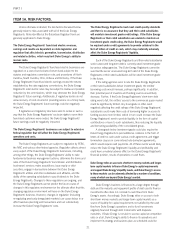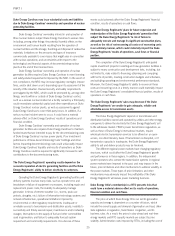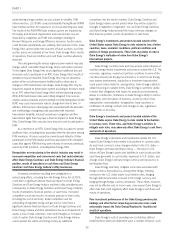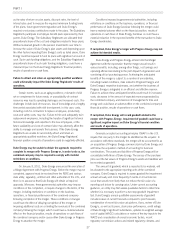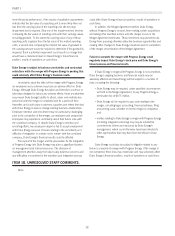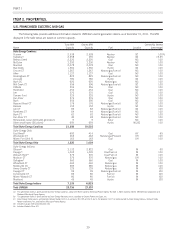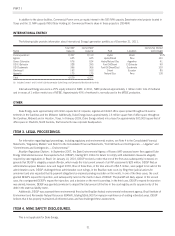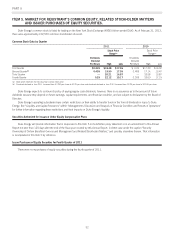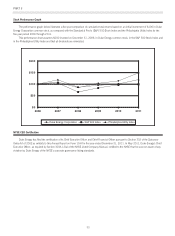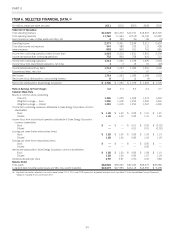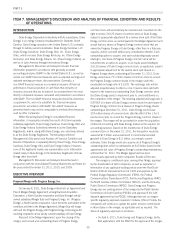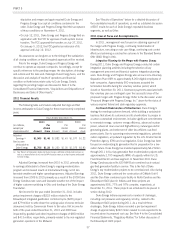Duke Energy 2011 Annual Report Download - page 48
Download and view the complete annual report
Please find page 48 of the 2011 Duke Energy annual report below. You can navigate through the pages in the report by either clicking on the pages listed below, or by using the keyword search tool below to find specific information within the annual report.
PART I
recent financial performance. If the results of qualitative assessments
indicate that the fair value of a reporting unit is more likely than not
less than the carrying value of the reporting unit, the two-step
impairment test is required. Step one of the impairment test involves
comparing the fair values of reporting units with their carrying values,
including goodwill. To the extent the carrying value of any of those
reporting units is greater than the fair value of the related reporting
units, a second step comparing the implied fair value of goodwill to
the carrying amount would be required to determine if the goodwill is
impaired. Such a potential impairment could result in a charge that
would have a material impact on Duke Energy’s future financial
position, results of operations or cash flows.
Duke Energy is subject to business uncertainties and contractual
restrictions while the merger with Progress Energy is pending that
could adversely affect Duke Energy’s financial results.
Uncertainty about the effect of the merger with Progress Energy
on employees and customers may have an adverse effect on Duke
Energy. Although Duke Energy has taken and intends to continue to
take steps designed to reduce any adverse effects, these uncertainties
may impair Duke Energy’s ability to attract, retain and motivate key
personnel until the merger is completed and for a period of time
thereafter, and could cause customers, suppliers and others that deal
with Duke Energy to seek to change existing business relationships.
Employee retention and recruitment may be particularly challenging
prior to the completion of the merger, as employees and prospective
employees may experience uncertainty about their future roles with
the combined company. If, despite Duke Energy’s retention and
recruiting efforts, key employees depart or fail to accept employment
with Duke Energy because of issues relating to the uncertainty and
difficulty of integration or a desire not to remain with the combined
company, Duke Energy’s financial results could be affected.
The pursuit of the merger and the preparation for the integration
of Progress Energy into Duke Energy may place a significant burden
on management and internal resources. The diversion of
management attention away from day-to-day business concerns and
any difficulties encountered in the transition and integration process
could affect Duke Energy’s financial position, results of operations or
cash flows.
In addition, the Merger Agreement restricts Duke Energy,
without Progress Energy’s consent, from making certain acquisitions
and taking other specified actions until the merger occurs or the
Merger Agreement terminates. These restrictions may prevent Duke
Energy from pursuing otherwise attractive business opportunities and
making other changes to Duke Energy’s business prior to completion
of the merger or termination of the Merger Agreement.
Failure to complete the merger with Progress Energy could
negatively impact Duke Energy’s stock price and Duke Energy’s
future business and financial results.
If Duke Energy’s merger with Progress Energy is not completed,
Duke Energy’s ongoing business and financial results may be
adversely affected and Duke Energy will be subject to a number of
risks, including the following:
• Duke Energy may be required, under specified circumstances
set forth in the Merger Agreement, to pay Progress Energy a
termination fee of $675 million;
• Duke Energy will be required to pay costs relating to the
merger, including legal, accounting, financial advisory, filing
and printing costs, whether or not the merger is completed;
and
• matters relating to Duke Energy’s merger with Progress Energy
(including integration planning) may require substantial
commitments of time and resources by Duke Energy’s
management, which could otherwise have been devoted to
other opportunities that may have been beneficial to Duke
Energy.
Duke Energy could also be subject to litigation related to any
failure to complete its merger with Progress Energy. If the merger is
not completed, these risks may materialize and may adversely affect
Duke Energy’s financial position, results of operations or cash flows.
ITEM 1B. UNRESOLVED STAFF COMMENTS.
None.
28





